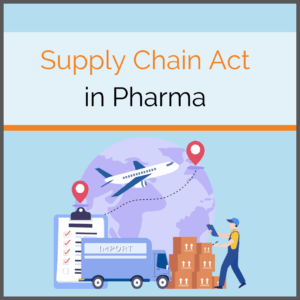
The Supply Chain Due Diligence Act (LkSG), commonly referred to as the Supply Chain Act, was passed in 2021 and came into force in Germany in 2023. Since 2024, companies with more than 1,000 employees are subject to its provisions. These companies are required to identify, assess, and mitigate human rights and environmental risks along their supply chains. The goal is to ensure that products are not manufactured under conditions such as child labor, forced labor, or environmental pollution. Companies must establish risk management systems, conduct regular analyses, and report on their measures. The European Union also plans to introduce its own supply chain law. It will apply in 2029 to companies with over 1,000 employees and an annual turnover of €450 million.
In the pharmaceutical industry, the Supply Chain Act is already particularly relevant. The sector is highly globalized and characterized by complex supply chains. Active ingredients and packaging materials often come from countries with lower social and environmental standards. The law compels companies to create transparency and take responsibility for conditions at their suppliers. Sustainability thus becomes not only an ethical obligation but also a regulatory requirement. Environmental aspects such as the disposal of antibiotic residues or CO₂-intensive cold chains are just as much in focus as social issues like fair working conditions. The Supply Chain Act promotes a more sustainable and responsible pharma industry. Positive impacts on the environment, society, and corporate reputation are its desired benefits.
Regulatory Measures in the Pharma Industry
The aim of the law is to extend corporate responsibility beyond the company’s own operations to direct and indirect suppliers.
Specific measures include:
- Risk Management System: Companies must implement a structured system that captures human rights and environmental risks throughout the entire supply chain, including regular risk analyses.
- Policy Statement: A publicly accessible statement must outline the human rights and environmental principles as well as the strategy for fulfilling due diligence obligations.
- Preventive and Remedial Measures: When risks are identified, actions such as training, contractual clauses, supplier audits, or alternative sourcing must be taken.
- Complaint Mechanism: An internal or external procedure must be established through which affected parties can report grievances. The handling of complaints must be documented and traceable.
- Reporting Obligation: Companies must submit an annual report on the fulfillment of their due diligence obligations to the Federal Office for Economic Affairs and Export Control (BAFA).
Violations can result in fines, enforcement measures, and exclusion from public tenders. BAFA is authorized to conduct audits and impose sanctions. Similar measures and sanctions can also be expected for the European Supply Chain Act.
Benefits of a Sustainable Supply Chain
Sustainability is increasingly seen as an integral part of corporate value creation. In the pharmaceutical industry, this includes not only ecological but also social dimensions: fair working conditions, responsible resource use, and transparent supply chains. Companies that strategically embed sustainability benefit from long-term resilience and are better prepared for regulatory changes, reputational risks, and market uncertainties.
Investor behavior is also changing: capital providers increasingly evaluate companies based on ESG criteria (Environmental, Social, Governance). Those who credibly implement sustainability improve their chances of securing financing and partnerships. Pharmaceutical companies that can demonstrate sustainable sourcing strengthen their market position with hospitals, pharmacies, and wholesalers.
Finally, sustainability is a driver of innovation. It encourages resource-efficient production processes, digital transparency solutions, and new business models. Strategically approached, sustainability is not a cost factor but a competitive advantage. Especially in the pharma industry, which relies on trust, quality, and global responsibility this is evident.
Impact of the Supply Chain Act on the Pharma Industry
The Supply Chain Act particularly impacts the pharmaceutical industry due to its highly globalized and complex supply networks. Many active ingredients and packaging materials are sourced internationally, often from regions with differing regulatory standards. In some cases, challenges related to environmental protection, occupational safety, and waste management have been reported. These may include insufficient safety measures when handling chemicals or inadequate disposal of pharmaceutical residues. Additionally, concerns about fair labor practices and working conditions can arise.
If a company receives indications of such violations, it is legally obliged to take appropriate measures:
- Supplier audits to verify conditions on-site
- Contractual adjustments, such as ESG clauses or sanctions for non-compliance
- Training programs for suppliers to improve environmental and social standards
- Switching to alternative sources if no improvement is possible
- Participation in industry initiatives to establish common standards
These measures must be documented and disclosed in the annual report to BAFA. The Supply Chain Act encourages the pharmaceutical industry to actively and systematically address sustainability risks, while promoting a more responsible supply chain in the long term.